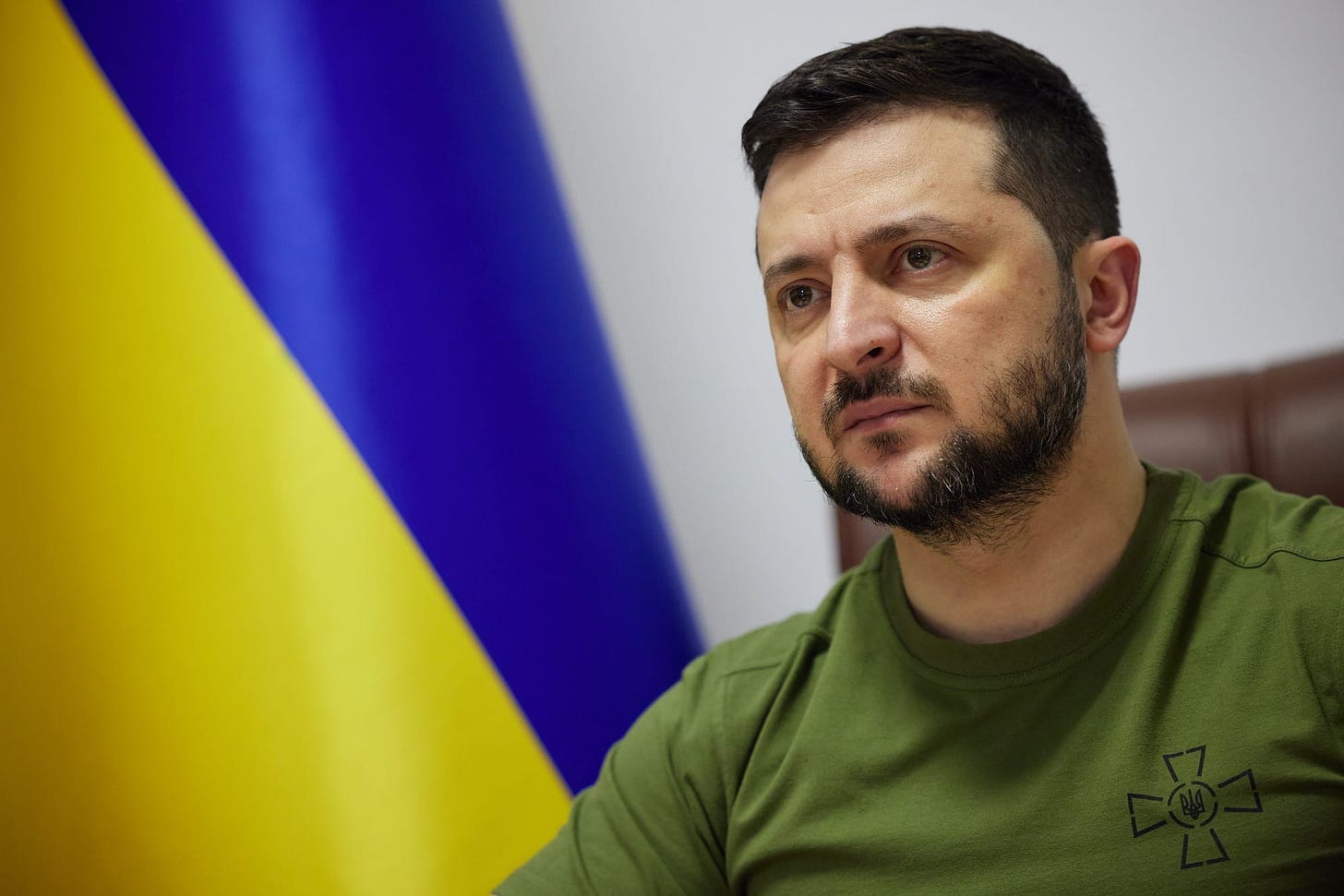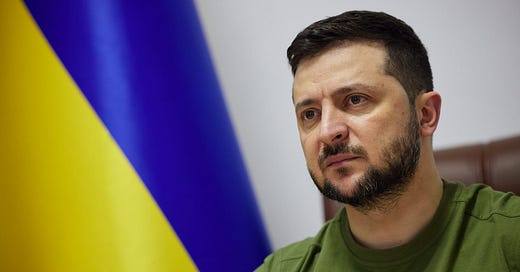Ukraine's cross-border offensive
Is Ukraine’s offensive in Russia's Kursk region an effective tactic? Viewpoints from multiple sides.

Enjoying Framechange? Forward to a friend to help spread the word!
New to Framechange? Sign up for free to see multiple sides in your inbox.
Learn more about our mission to reduce polarization and how we represent different viewpoints here.
Quick announcements
Next week, we'll be taking a break from our regular publishing cycle. A brief hiatus before the home stretch of the US presidential race.
For some light reading in the meantime, I recommend checking out the Rambull newsletter by Rob Belk. It's a weekly email that features recommendations from people on things they find useful, interesting, or unique.
I was honored to be featured in last week's edition for the work we're doing with Framechange. You can check out my personal recommendations here.
See you again in two weeks.
Eric
Snippets
Justice Juan Merchan postponed sentencing in former President Donald Trump’s “hush money” case until after the presidential election. The judge cited the “unique time frame this matter currently finds itself in.”
The US justice department alleges a Russian state media network, RT, orchestrated and funded a Tennessee-based media company to generate content amplifying Russian interests in the US. It accuses the operation of funneling millions of dollars to US podcasters and social media personalities to create content.
A 14-year old boy was charged with the killing of 4 people in a shooting at Apalachee High School outside Atlanta. The boy’s 54-year old father was arrested on multiple charges including second-degree murder for allowing the boy to possess a firearm.
The UK is suspending 30 of its 350 arms export licenses to Israel due to its concern some weapons could be used in ways that violate international humanitarian law.
President Biden will reportedly block Japan-based Nippon Steel’s proposed $14.9B acquisition of US Steel. The deal has been under investigation by the Biden administration for national security considerations.
What’s happening
Ukraine now controls an estimated 500 square miles of territory in southwestern Russia’s Kursk region after launching a surprise cross-border attack on Aug 6. It continued its offensive with strikes last week that damaged Russian infrastructure including an oil depot 800 miles from the Ukrainian border. In parallel, Ukraine has continued periodic drone strikes – largely foiled by Russian defenses – including an attack that saw 11 drones shot down over the Moscow region.
Meanwhile, Russia has continued its assault in Ukraine’s Donetsk province – the center of gravity in the war – advancing within 5 miles to Pokrovsk, a city viewed by observers as strategically critical to Ukrainian military supply lines.
This week, Russia struck a military institute and hospital in the central Ukrainian city of Poltava with a long-range missile attack that killed at least 51 and injured 271, its deadliest strike in Ukraine this year. It also launched a missile and drone attack on the western Ukrainian city of Lviv that killed 7 civilians.
What’s next: The Kursk offensive, according to Ukrainian President Volodymyr Zelensky, is part of a 4-stage “victory plan” he is planning to present to President Joe Biden and presidential candidates Donald Trump and Kamala Harris this month. Zelensky hinted the plan encompasses: 1) the Kursk incursion in Russia; 2) Ukraine's "strategic place in the security infrastructure of the world;" 3) a "powerful package of forcing Russia to end the war in a diplomatic way;" and 4) an economic focus.
Russia has said it would not engage in peace talks and remains committed to capturing the broader Donbas region in eastern Ukraine.
Zelensky’s push: Zelensky has recently pushed for greater leeway in using US-provided long-range missiles against targets in Russia. To date, the US has only permitted Ukraine to use the weapons against Russian forces crossing the border – part of the terms associated with an estimated $69.8B in military aid the US has provided to Ukraine since the start of the war. (Last month, Ukraine received its first batch of F-16 fighter jets from NATO states to defend against Russian missile strikes.)
Ukraine’s Kursk offensive has surfaced debate over its potential impact on the war and the extent to which it will help Ukraine achieve its objectives. This week, we bring you the viewpoints from multiple sides. Let us know what you think.
Notable viewpoints
More supportive of the Kursk offensive:
The Kursk offensive has exposed Russian weaknesses and embarrassed Putin.
The Kursk attack caught Russia off guard and embarrassed Putin during a time when his regime faces pressure from a prolonged war, tightening sanctions by the West, and high inflation.
The surprise and scale of Ukraine’s Kursk assault, which has driven 120,000+ Russian evacuees from the area, puts a dent in Putin’s narrative that he is in full control of the war and able to protect Russians from the war hitting home; analyses of Russian social media posts suggest the Russian public has developed a more negative sentiment toward Putin since the Kursk attack.
The lack of a significant response by Russia to Ukraine’s Kursk offensive, which crosses a “red line” set by Putin, shows that Putin’s threats to escalate the war and even consider nuclear weapons in retaliation for certain levels of Ukrainian and Western aggression are hollow.
The Kursk offensive has boosted Ukrainian morale and leverage with Western supporters.
The Kursk incursion has boosted morale for Ukrainian soldiers and citizens during a time where the country has increasingly looked to be fighting an unwinnable war.
Success in Kursk has shown that with additional military support from the US and allies – such as the permission to use American long-range missiles on military targets deeper into Russia – Ukraine can win the war.
Holding Kursk for an extended period, along with continued strikes in Russia, could provide Ukraine with some negotiating leverage in efforts to end the fighting.
Occupying Kursk provides Ukraine with tactical advantages.
Advancements in Kursk, paired with effective strikes on targets deeper in Russia, will enable Ukraine to disrupt supply lines and slow Russian military operations.
Ultimately, Ukraine’s occupation of the Kursk region will force Russia to divert resources away from the Donetsk region and slow its broader advance through Ukraine.
Less supportive of the Kursk offensive:
The Kursk offensive has diverted Ukrainian resources away from the homefront while failing to divert Russian resources.
The offensive in Kursk has achieved minimal territorial gains at the expense of using vital artillery and tank resources that are critical to Ukraine’s continued defense.
The Kursk incursion has diverted and dispersed some of the best Ukrainian forces away from the war’s center of gravity in Donetsk, making it more difficult to repel Russia’s advances.
The Kursk attack has failed to divert Russian resources away from the Ukrainian front in Donetsk – with Russia sending reinforcements to Kursk from elsewhere – and the Russian advancement toward Pokrovsk has only accelerated.
Losing Pokrovsk – a possibility that seems to have increased since Ukraine’s Kursk offensive began – could have cascading effects for Ukraine, enabling Russia to advance more freely toward other important cities such as Sloviansk and Kramatorsk and take the entire Donetsk province.
“[F]or Russia, the Kursk incursion may be viewed as a strategic victory, not because of any direct military engagement in Kursk but because it has drawn Ukrainian resources away from more critical fronts. By maintaining their focus on Donetsk, Russian forces have been able to press their advantage, potentially opening new opportunities to exploit Ukrainian vulnerabilities along the eastern front.” (Andrew Latham, The Hill.)
Occupying Kursk will not give Ukraine significant negotiating leverage.
Ukraine’s control of territory in Kursk won’t provide a major bargaining chip; it controls roughly 500 square miles – amounting to roughly 0.006% of Russia’s land area – while Russia controls roughly 20% of Ukraine.
Having had little tangible effect on Russia’s advancement in Donetsk so far, Ukraine’s Kursk offensive has opened President Zelensky up to potential criticism both at home and abroad, jeopardizing sustained support for his strategy.
Attacking Kursk has come at the cost of higher Ukrainian casualties with minimal long-term benefit; Russia will eventually be able to divert more resources to take back the region when it needs to.
Other viewpoints:
“Ukraine’s fate will be determined primarily by what happens in Ukraine, and not by the Kursk operation. The key factors will be each side’s willingness and ability to keep sacrificing on the battlefield, the level of support Ukraine receives from others, and whether a deal can eventually be struck that leaves the unoccupied parts of Ukraine intact and secure.” (Stephen Walt, Foreign Policy.)
Several Russian errors during the war, including its unpreparedness for Kursk and the fact that even its successful advances have been slow, have demonstrated Russia doesn’t pose a significant threat to the rest of Europe.
The US and its allies should allow NATO forces like those of Poland to help Ukraine defend its airspace against missile attacks; Putin is unlikely to escalate the fighting as a confrontation with the West, regardless, given he knows he is outmatched by NATO militarily and such an escalation would be politically catastrophic at home.
Ukraine is still fighting an unwinnable war and, rather than using the Kursk offensive as encouragement to fund an escalation of the war, the US and its allies should work with Ukraine to use it as an opportunity to negotiate an end to the fighting as soon as possible.
Ukraine’s Kursk campaign is a sign that its risk tolerance has risen amid uncertainty around the outcomes of the upcoming US elections; Ukraine may see the current moment as the best time to win support for more ammunition and greater tactical leeway from American leaders.
Be heard!
We want to hear from you! Comment below with your perspective on Ukraine’s Kursk offensive and we may feature it in our socials or future newsletters. Topic ideas to consider:
Do you think the Kursk offensive will help Ukraine advance its goals?
What are some arguments or supporting points you appreciate about a viewpoint you disagree with?
Give us your feedback! Please let us know how we can improve.
#BTW
Check out this soulful groove, “That Easy,” by British indie-pop singer Yellow Days. Listen on Spotify, Apple Music, or Amazon Music.




